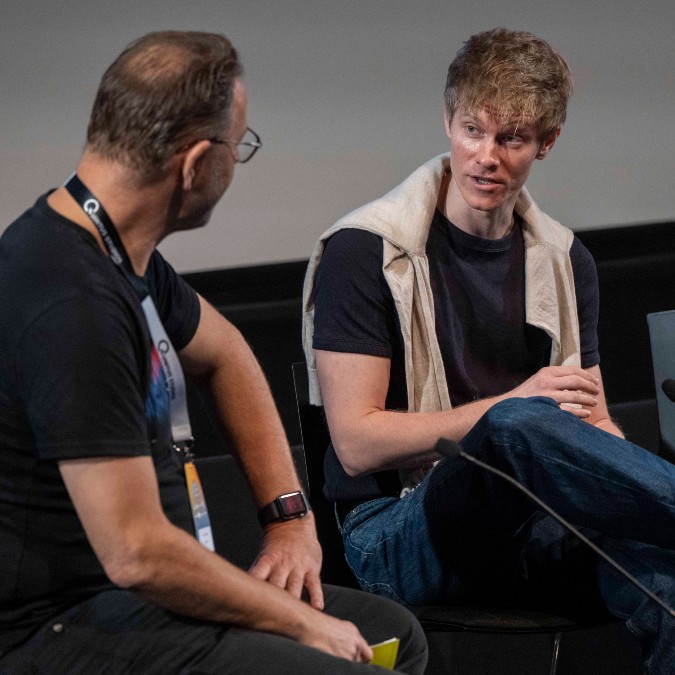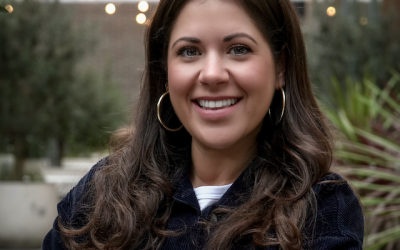From humble beginnings on YouTube, creator collective The Sidemen have built a media empire, with 50 staff and around 40 regular freelancers producing 11 videos a week – and bigger projects.
Unscripted competition Inside has become a worldwide franchise, taking Netflix by storm, while the group’s annual charity football match is an appointment-to-view event both online and on TV.
At TellyCast’s Digital Content Forum 2025 this morning, Sidemen Entertainment’s Victor Bengtsson discussed how Inside was made, and the lessons it holds for the rest of the industry.
“We call it our breakout year,” he said of a 2025 when Sideman doubled down on launching their own production company, not to mention selling out Wembley in under an hour and a half for the football match.
Inside was the first fruit of the company’s core mission in 2024 to explore “not only for creators to upload YouTube videos, but what would it be like if we took a stab at a format… what is Big Brother for Gen-Z?”
The timescales involved were impressive: 30 days of pre-production, seven days of shooting and nine days of editing, with Inside going live the next day. It was watched 55m times in a matter of days. ”
“At that point, we basically got pinged by all the streamers!” laughed Bengtsson. One of those streamers was Netflix, which offered a multi-season deal. The partnership is one of collaboration. “Let’s take what we have learned from our world and what you have learned from your world, and try to find the middle spot,” he explained.
“It’s been trial and error for sure,” he said. But it has been a powerful lesson in how to take a digital format to the bigger screen, with Inside’s US edition topping Netflix’s chart in the US.
Bengtsson has been enjoying getting an insight into how the TV world works, suggesting that while the scripted sector is lionised in that industry, the unscripted sector is often looked down on. “On YouTube, it’s the opposite,” he said. He also expressed puzzlement at the TV world’s obsession with viewing figures as a success metric.
“Everything feels like it MUST deliver. For us, if it doesn’t work, we’ll fuck it off and try something else!” he grinned. Bengtsson also took a jab at one of the formats that inspired Inside. “Big Brother is boring because the people who make Big Brother don’t want to make Big Brother!” he said. And while he talked up the way Sidemen Entertainment aims to make production fun, there are still serious quality bars. “If we make this and it’s not the best thing we’ve ever done, we don’t want to put it out,” he said.
He offered more insight into the rules that drive Sidemen Entertainment, where the average age of its employees is 24. “We have a rule which is avoid all experts. Don’t get anyone who has ‘expert’ in their title in the [development] room,” he said. “And we have a rule that every pitch has to be a single sentence, like a YouTube title. ‘Throw tiny items into a jar’. That’s the show. We had one last year that was ‘Hide and Seek: but the island is full of smoke’. Or ‘How about no one pisses for 24 hours?’ Then I realised there is health and safety. We had to call an ambulance, so that’s not great…”
The process is that the company’s young creative team sit in a room coming up with challenges and ideas, and only then are the best ones shown to people who have expertise making formats, so they can “poke holes in what the children made”. That’s another rule: “Get people with real experience to poke holes in what you do, but don’t get them in from the get-go [when formats are being dreamed up].”
Bengtsson talked about the economics of a creator collective, noting that one recent video that got 3m views cost precisely £895 to produce. But he warned TV companies coming into the digital space not to over-focus on profitability as their driving motivation.
“It’s not a question of profitability, it’s about discoverability. Being part of the culture, being part of the conversation. You can’t put a price on that,” he said. “Thinking like a creator means thinking about the format first, and what you’re producing, and then thinking how can we make the best thing possible?” he said.
Bengtsson also highlighted one of the Sidemen collective’s strength: their rule that the seven co-founders each have an equal vote in creative and commercial decisions.
“You have seven creative directors that make calls across everything!” he said. “Anything that anyone want to do, at any point if any of the Sidemen scream ‘Vote!’ everyone votes, and if four vote in favour, the other three have to go along with it.”
Those co-founders are still at the core of the company: even if they are not in the room when ideas are being devised, they have a livestream so they can watch and make suggestions.
“They are live-chatting and changing the format constantly,” he said. “I’m happy that they are maybe taking more of a step back on the day-to-day operations of the company, so that they can focus fully on the creative execution.”
He also talked about what’s next for Inside. “UK season three… my hope is that we’re releasing the next season of he UK in early, late spring. Sometime in Q1 next year,” he said. “We’re in conversations. We’re in a good place. We want it to feel fresh and new, and we want it to have a home.”





